To further realize the cultivation goal of a new generation of information engineers, implement the teaching method of students' active learning under the guidance of teachers, strengthen the design, research and innovative, and practical teaching contents and meet the needs of national economic construction and national defense construction for innovative talents, the Department of Electronic Engineering established the Experiment Teaching Center, Department of Electronic Engineering, Tsinghua University in 2008.

Experiment Teaching Center, Department of Electronic Engineering, Tsinghua University
The center is the first-level lab of Tsinghua University, and now has 12 labs: Electronic Circuit Lab, Exploration and Innovation Lab, Laser Darkroom, Physical Electronics and Optoelectronic Technology Lab, Modern Communication Circuit Lab, Electromagnetic Field and Microwave Lab, Modern Communication Lab, Computer and Network Lab, Integrated Electronic System Design Lab, Signal Processing Lab, Image Voice Lab, National Defense Series Courses and Seminar Series Lab. In addition, the center also has 8 joint labs: Tsinghua-Agilent Modern Communication Circuit Lab, Tsinghua-Agilent Modern Communication Lab, Tsinghua-Agilent Electromagnetic Field and Microwave Lab, Tsinghua-Agilent EEsof ADS Microwave Simulation Joint Lab, Asus -Tsinghua Next-generation Portable Digital Equipment Teaching and Research Joint Lab, Network Teaching Lab, Department of Electronic Engineering, Tsinghua University, ZTE NC Education Certification Management Center, Tsinghua University (Department of Electronic Engineering)-ALTERA Company SOPC/DSP Joint Lab and Training Center, and Tsinghua University (Department of Electronic Engineering)-Xilinx Digital System Joint Teaching Lab.

Communication Circuit Lab |
Computer and Network Lab |
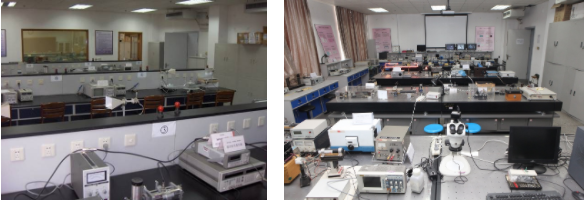
Electromagnetic Field and Microwave Lab |
Physical Electronics and Optoelectronics Lab |
The Center covers an area of nearly 1,500㎡, has more than 1,200 devices and total assets of nearly RMB 20 million; It now has 18 full-time staff, including 4 professors, 7 associate professors, 2 people with intermediate titles, and 4 other personnel; The center undertakes 40 experimental courses, implements 270 experimental projects and admits nearly 2,000 undergraduate and graduate students from the Department of Electronic Engineering, School of Information Science and Technology and other majors of Tsinghua University every year. It has completed a total teaching workload of nearly 180,000 man-hours.
The Experimental Teaching Center has clarified a hierarchical practical teaching talent cultivation model, including four levels, namely talent cultivation, talent innovation cultivation, cultivation of innovative talents, and cultivation of top-notch innovative talents. Based on the talent cultivation goal and model and according to the nature of the course and teaching purpose, the Center has proposed a teaching model in which the experiment is divided into three levels, namely core foundation experiment, professional experiment, and comprehensive system experiment.
Relying on two first-level disciplines, electronic science and technology, information and communication engineering and based on theories of communication, circuits and systems, electromagnetic field and wave, signal and information processing, the motion of electrons and photons and the laws of their interaction in different media and taking the combination of practice and theory as the core, the Center continuously enriches, develops and improves the experimental teaching of the Department of Electronic Engineering, cultivates students' ability to comprehensively master and use theoretical knowledge to solve practical problems, cultivates students' preliminary scientific research ability, and stimulates their innovative thinking, enhances the consciousness of innovation, and has formed a scientific and reasonable practical teaching system.
To promote the experimental teaching reform, the Experimental Teaching Center also has put forward the experimental teaching construction concept of "grasping both ends, promoting the middle, and building three categories of platforms" based on the hierarchical talent cultivation model. Emphasize the high-end exploration of "relying on discipline advantages, promote the transformation of achievements in scientific research into experimental teaching content and create a cutting-edge and innovative experimental environment and platform", and the basic end practice of "reforming and optimizing basic experimental teaching content and platform" and promote the intermediate link of "comprehensive design, exploration and innovative experiment and platform".
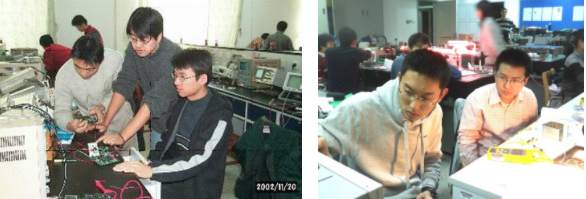
Communication Circuit Experiment |
Optoelectronic Technology Experiment |
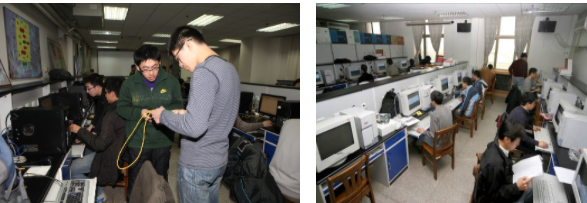
Computer Network Experiment |
Computer Software Experiment |
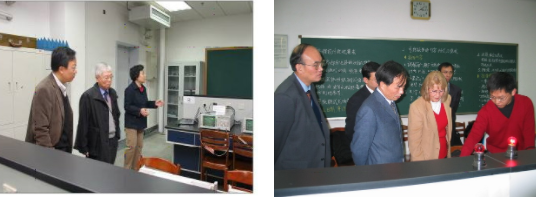
Teaching Evaluation Site |
Visiting Reception |
Teaching Labs of Electronic Engineering Department
![]()
